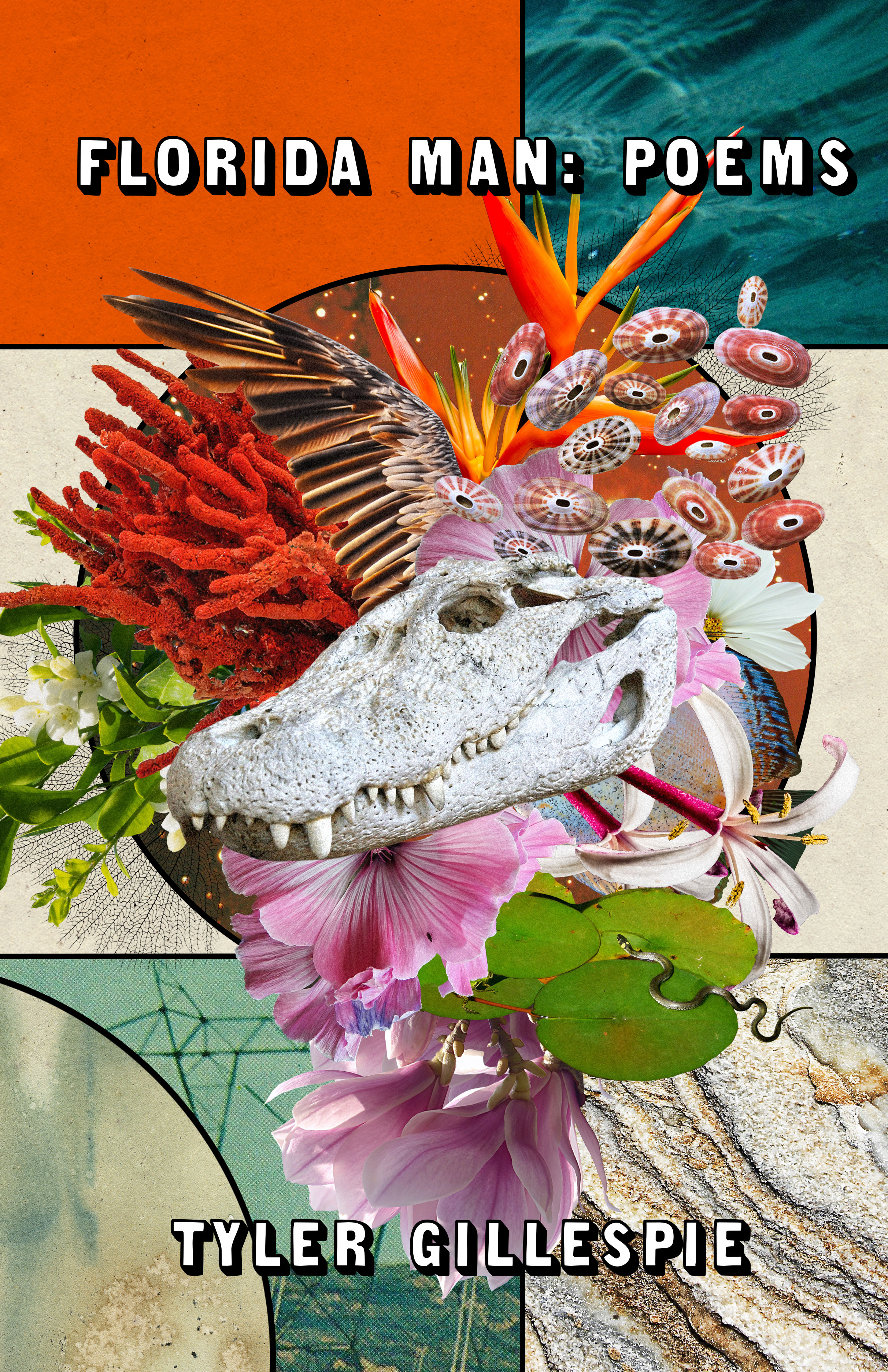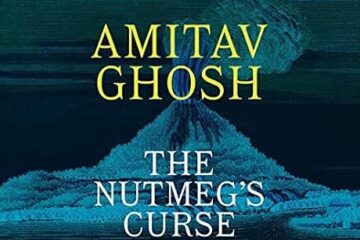Tyler Gillespie
Finishing Tyler Gillespie’s Florida Man, I felt a sense of having just consumed a layer of the future fossil record of Florida, so simultaneously precise and wide-ranging was Gillespie’s natural history of his home. The book begins with snapshots of a Florida that the rest of the United States loves to sensationalize and make fun of with the poems “Alligator Tears,” “Bush v Gore Election, 2000,” and “Year of Actual Headlines on @_FloridaMan Twitter Account (381,000),” in which Gillespie compiles a year of “Florida Man” headlines. These poems set the stage for a raucous, slightly unhinged ride, as faceless Florida Men stuff pythons down their pants, run themselves over, rub feces on piers to mark favorite fishing spots, paint anti-Hillary Clinton messages on crabs, and tattoo themselves with “Trump’s Baby Dick.” Mixed in to the early poems highlighting the stereotypes is a poem detailing the tendency of alligator males to eat their young when hungry—assuming they stick around long enough—which highlights Gillespie’s own birth and draws a connection between the author and alligators. This theme proves important to the cohesion of the book, along with another poem about Gillespie’s maternal ancestry, which helps remind the reader that this natural history focuses on one particular Florida Man: Gillespie himself.
Once Gillespie has laid the bedrock of the sensationalized Florida moment he writes about, he embarks on an exploration of the lived experiences of Florida residents within that moment, experiences which both confirm and combat the stereotypes assigned them by the mass media. Balanced atop a dense milieu of swamp, vacation paradise, unraveling ecosystem, myth, and white-trash stereotypes, Gillespie inspects—among other things—the forces that led him to his own past as a young queer man developing a taste for alcohol and wildness in clubs in Miami during the 2000s. He astutely examines the nature of addiction in poems like the excellent, “Self-Portrait as Rain Water,” and in “Alligator Mississippians,” in which he offers a portrait of his father as the embryonic source of his alcoholism, comparing him to an alligator—“I can only be so mad at a man whose nature is to bite”—a metaphor which links back to early poems in the book and reinforces Gillespie’s own gator nature. He also traces his maternal lineage, investigating the uncertain cultural identity of Florida, asking: is it part of the south? Or does it exist separate from the rest of the United States, in a practically post-apocalyptic condition, blinded by sunlight, fueled and distorted by a hefty supply of drugs pouring into the state from port cities like Miami while Florida Man “steals dozens of pigeons wearing [a] trash bag and bucket on his head”?
Gillespie creates the flesh of his portrait of Florida through investigative journalism. In, “Florida Woman Repeatedly Slapped Grandma for Rejecting Facebook Friend Request,” Gillespie offers an incisive portrait of the “Florida Woman” in question, 27-year-old Rachel Hayes, by weaving the dramatized story of elder abuse with a narrative account of his conversation with Hayes who is the same age as him and grew up in the same county. Hayes, it turns out, did not repeatedly slap her grandmother over a denied friend request. (She may not have slapped her grandmother at all, and if she did, it had nothing to do with Facebook). In the poem, it’s revealed that the abundance of wacky Florida resident headlines—and the internet phenomena of Florida man—exist as a phenomena because arrest reports in Florida are made public, enabling reporters to seize and publish dramatic and stories about Florida residents devoid of context. The headline, which went viral—appearing internationally—naturally changed the course of Hayes life, and Gillespie dryly notes that his own arrest report could easily have made it on to the Florida Man Twitter account. The poem about Hayes contrasts poignantly against one of the earliest poems in the collection, titled simply “Florida Man,” about a man, also Gillespie’s age, who beat his grandmother and ran off with her jewelry, leaving her in critical condition. The similarly absurd stories between Gillespie and these two young Floridian individuals leaves the reader with the understanding that the insanity of Florida is in part a product of how its story has been told, that the identity—and therefore behavior—of a Floridian may be profoundly influenced by fictitious narratives created to entertain a human population with an increasingly short attention span. His portraits of individuals contending with the identity of the place that cradles them are particularly engaging, and I could happily read another book of poems just comprised of Gillespie’s conversations with other Florida residents about their experiences of home.
Florida Man exists in a liminal space between the traditional forms of poetry, memoir, and journalism. And, although at times the nonfiction editor in me wished he would use more articles in his sparse, disjointed prose, Gillespie won me over to his particular brand of genre-hybridizing lyricism. Indeed, something about the shape of Gillespie’s poetry matches the cadence of the world he exposes and allows him to arrive at a thesis at once deeply affecting and ineffable. Florida Man reveals a Florida teeming with both physical and mythological lives, creating a confluence of unusual social and ecological forces that are all poised to vanish under saltwater in the near future.
Reviewer Bio: Iza Bruen-Morningstar is a naturalist and writer from Northern New Mexico.




